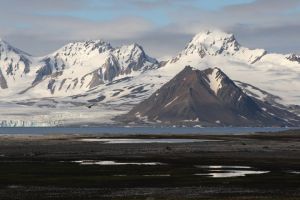Giant glaciers, a beautiful, shimmering lush green tundra, mountain slopes full of squawking birds, rugged landscapes, reindeer strolling through a small town and a hint of concern over the possibility of encountering a polar bear. It is a brief overview of central Spitsbergen.
The Svalbard archipelago, with its largest island, Spitsbergen, is a spot where scientists from around the globe are drawn to. It is a testing ground for the study of Arctic change. PhD students from the Doctoral School of Natural Sciences in the IGLOO course have also worked and studied there.
Doctoral students with a wide range of interests were recruited for the project - from a researcher of microfauna living in bryophytes and soils through botanists and ornithologists to geologists. The selected candidates included Małgorzata Niśkiewicz, Julia Gostyńska, Natalia Lis, Szymon Świątek, Jakub Buda, Ronald Łaniecki, Wojciech Wysoczański and Kornel Michalak. All of the chosen doctoral students have been interested in Arctic ecosystems for years. Some of them associate their future work with these regions, and the course allowed them not only to fulfil the dream of the expedition but also to arrange their research plans in their heads.
The main objectives of the PhD students' trip included understanding the impact of seabirds on the functioning of tundra ecosystems, an introduction to the functioning and role of glacial (ice) ecosystems, including the collection of ice cores, the identification of vascular plants in different ecosystem types (seabird colony versus glacier foreground) or the grouping of plastics on Arctic beaches and the study of plastisphere (organisms inhabiting plastic).
"It is really gratifying to see the joy of scientific and exploratory dreams fulfilled. A year ago, the Faculty of Biology organised a student-led BioGeoEko course in the Arctic. This season, however, was packed with the IGLOO Summer School for PhD students. I hope this is the beginning of a collaborative, interdisciplinary effort to study such exciting and rapidly changing Arctic ecosystems." - writes Prof. Krzysztof Zawierucha, organiser of the school.
